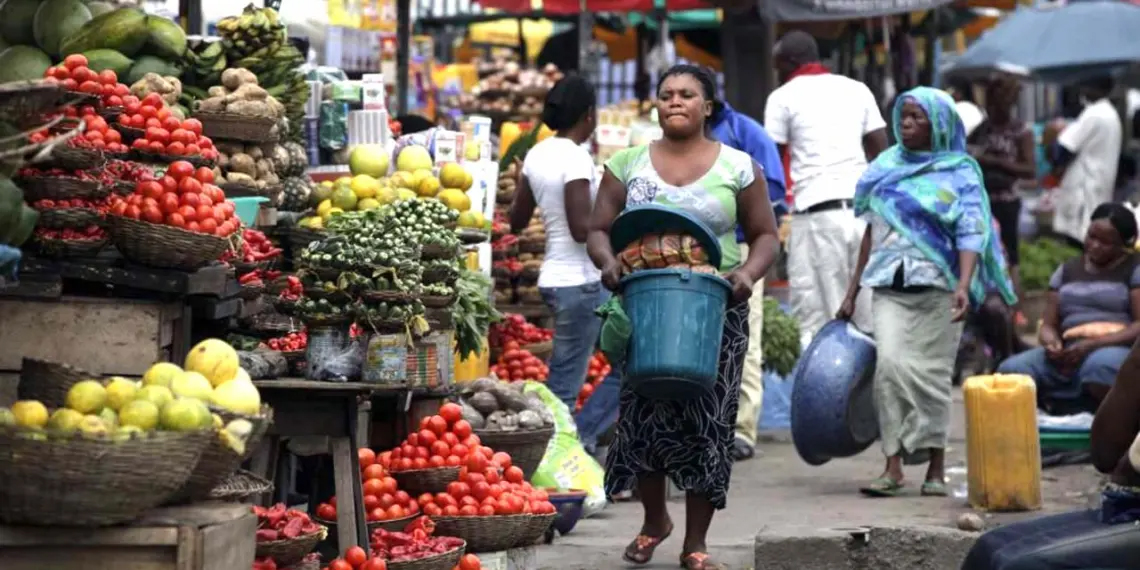A couple of weeks ago, President Bola Tinubu gave a marching order to the Federal Executive Council (FEC) to take urgent measures to reduce food prices nationwide, with a particular focus on ensuring the safe and unhindered movement of farm produce across transport routes.
The Minister of State for Agriculture and Food Security, Senator Sabi Abdullahi, relayed the president’s message in Abuja, while presenting a paper at a capacity building workshop for journalists covering the Senate.
He explained that the vision for food sovereignty was within the ambit of food security and food sufficiency, which encompassed availability of food, accessibility, as well as affordability, and in right nutritional content on a sustainable basis.
But despite the optimism and hope the tone of the declaration resonate, Nigerians, especially the sector players are cynical about the statement, describing it as a mere declaration that lacks the necessary will-power to make any change.
Recall that two years ago, July 13, 2023 to be precise, the president declared an immediate State of Emergency on food insecurity to tackle the increase in food prices. The presidency revealed that some of the government’s steps as part of the state of emergency would be in the short, medium and long term.
“In the immediate term, we intend to deploy some savings from the fuel subsidy removal into the agricultural sector, focusing on revamping the agricultural sector.”
The president also directed that “all matters pertaining to food and water availability and affordability, as essential livelihood items, be included within the purview of the National Security Council.”
In July 2024, the Federal Government announced the suspension of tariff on imported grains, which aimed at tackling shortages. After these, many pronouncements and steps have been taken by this administration to address food security concerns in the country to bring down the cost of living for the citizens.
But sadly, the policies have made little or no impact, as price of commodities, especially foodstuff are no more affordable, going beyond the reach of the common man, who finds it difficult to put food on their tables.
The common question on the lips of many sector players begging for immediate answer is when the several pronouncements of the Federal Government will translate to reality; going by the fact that the food security challenge facing the country is getting worse daily.
The Chief Executive Officer, Produce Export Development Alliance (PEDA) formerly Agricultural Fresh Produce Growers and Exporters Association of Nigeria (AFGEAN), Aiyeola Adetiloye, who faulted the president’s path to solving the food crisis, said a decree will never crash high cost of food in any country.
“I don’t see any food price reduction that is based on decree. In the short term, it might achieve some results, but on the long term, it’s like we’re just only addressing the symptoms and not the root causes. A credible deflation part, rather than a decree will be more efficient.”
While noting that the Federal Government is only looking at one or two challenges causing the food crisis, Adetiloye said the problem is more multifaceted.
“I don’t think there is one cause for the high cost of foods in Nigeria. There are several cost drivers that are moving things together – naira deprecation, removal of fuel subsidy, disinflation, supply chain issues, low productivity, insecurity, which has led to the displacement of farmers and reducing farm production, high cost of fuel, weak logistics, and scarce storage facilities, are all responsible for high cost of food. Also, inputs are costlier now. Inputs like fertilisers, seeds, and chemicals are expensive and sometimes they are of questionable quality. You know that transportation cost adds to it.
“You would obviously agree with me that policies about agriculture in the last 10 years have been a bit inconsistent. We are opening duty free access for key stable products to cause price crash; we’re struggling to even implement closed borders. There are a lot of things that is really affecting food cost.
“And there’s also the price and demand side of it, right there or the demand and market side of things, which market forces would obviously be raining no matter what. So, the problem is more multifaceted.
“It’s not one factor that’s making food to be expensive, it’s a combination of supply and demand, combination of cost and input, combination of inconsistent policies and implementation of those policies, weak distribution and logistics supply chain, as a result of fossil fuel that powers logistics being expensive. It is coming from the fact that post harvest losses are high and storage is a bit scarce,” he stated.
On his part, a Cassava farmer and Processor, based in Kajola, Obafemi Owode Local Council, Ogun State, Igangan and Elekokan, Ibarapa areas of Oyo State, Mr. Kazeem Lamidi, who disclosed that mere declaration is not enough to address the lingering food challenge, said if past declarations had been backed with interventions, the food prices would have crashed.
He said: “If the Federal Government truly wants to reduce food prices sustainably, the focus should be on enabling environments and critical infrastructure. Let us channel efforts into providing subsidised mechanisation and irrigation services to the majority of these set of farmers.
“They are in need of feeder roads, rural storage, access to markets and affordable farm inputs that will ease their operations. Strengthen extension services for them, and also facilitate their easy access to credit to increase their productivity. These interventions would empower farmers to increase productivity, thereby reducing food prices naturally, without inflicting further hardship on those already stretched thing.
“As concerned citizens, we must advocate for our rural farmers. Help them organise, amplify their voices, and demand their fair share of existing support. Even if we don’t have money to give, we owe them our time, our attention, and our solidarity. Every citizen must understand that, every wrap of fufu, tuwo, or amala comes from the sweat of a farmer. The least we can do is say thank you. The best we can do is to ensure that crashing food prices don’t crush the very people feeding the nation.”
Adetiloye suggested that rather than the continuous issuing of pronouncements or declaration to solve food crisis, the Federal Government should focus on the factors that can completely lead to food price reduction and an end to food crisis in the country. “Let me just say that there are some factors that will cause food prices to crash. And if we actually know what will cause it to crash, at least we can then know the best way to crash it.
“The first thing is to stabilise the cost of getting food from farm to fork or to market. We need to be able to get a lot of volumes out so that the landing cost is lot more lower. We need to protect our local supply chain at the same time, you know, we shouldn’t just always open our borders.
“We shouldn’t just always import our inputs; we need to start developing local input industry for fertilisers, inputs, agrochemicals. I think the government should invest efforts to bring in and domesticate some seed companies that can operate from Nigeria. This would help farmers to locally access this in naira. It would bring down the cost of inputs. I know there are already efforts to seeing some prices starting to drop, but obviously, more can always be done.”
Adetiloye, however, disclosed that it’s not the price of all the food products that are on the rise, adding that the price of maize is coming down to the point that some farmers and farmer groups are trying to go on strike because they are incurring losses.
“So, the price of some produce have come down, this is due to the fact that government released fertilisers and inputs to farmers earlier this year. And some are still in circulation. So, it has really reduced the cost of production. More people are farming those produce, and it is affecting the price on the ground.
“We also need to look at post harvest losses. This has to do with the private sector because we are trying to invest in cold storage, drying infrastructure and warehousing. So, if we can do more warehousing, we can do all of that. We would have more products in circulation because we would lose less.
Adetiloye, who stressed that the problem is not that the orders are coming from Abuja, said the problem is that the costs are stacked at every step and, the supply chain is looking at every angle.
“We need to establish and stabilise transportation. We need to be able to protect farmers during production and harvest. We need to make, storage and reserves almost an automatic thing. We need to time imports strategically and with rules, cut losses with storage and try to improve quality of inputs, as much as possible….”
Lamidi regretted that the rural smallholder farmers are already sacrificing with their sweat and resilience to keep food on the nation’s table. “They are the unsung heroes of food affordability, farming year after year, rain or shine, profit or not, so that millions can afford basic staples. Despite their consistency and commitment, many of them still cannot afford the basic needs of life that some of us take for granted.
“Now, in the name of national welfare and reducing the cost of food for the masses, there is a push to further crash food prices. While this goal is noble and necessary, it must not come at the expense of the very people who make affordable food possible. It would be unjust to force smallholder farmers to further reduce their prices when they are already selling with little or no margins, often out of desperation to simply earn and sustain life.
“Commercial farmers, with better access to capital, mechanisation and support, often exit the food crop space when market prices fall or input costs rise beyond normal. But smallholder farmers; those cultivating just one or two acres always remain in the system. They persist without adequate support because their livelihoods, communities, and identities are tied to the land.
“Government support schemes often don’t reach them. Input subsidies, access to credit, and cooperative initiatives frequently bypass the very farmers who need them most. Yet, these farmers self-subsidise the nation’s food security, bearing the brunt of rising costs and erratic markets.”
To make true its promise, the Federal Government has assured that President Tinubu’s leadership would deliver true food sovereignty, ensuring that no family goes hungry and that the nation’s granaries overflow with homegrown abundance.
In his Independence Day message, the Minister of Agriculture and Food Security, Senator Abubakar Kyari Kyari said: “In the Ministry of Agriculture and Food Security, we reflect on how far we have come in harnessing our vast arable lands and natural resources to feed our people. Independence is not only political; it is also economic and agricultural self-reliance.
“His administration has prioritised agriculture as the backbone of our economy, implementing bold policies that empower farmers, enhance productivity, and reduce our dependence on imported food,” the Minister stated.
Just few weeks ago, Senator Kyari explained, “Through initiatives like the Renewed Hope Agenda, President Tinubu has mobilised resources to support smallholder farmers with improved seeds, fertilisers, and modern farming techniques.”
He added that the President’s “unwavering commitment ensures that we no longer rely on foreign nations for our staple foods, fostering a self-sufficient Nigeria where every table is abundantly supplied by our own soil.”
On his part, the Minister of State for Agriculture and Food Security, Senator Aliyu Sabi Abdullahi, few days ago, reiterated that farmers across the country must have access to affordable and high-quality seeds, for the country to increase its agricultural yield and derive forex from export.
Abdullahi said seed quality remains the foundation of any agricultural system. “This is at the heart of what we do to support the President’s vision for food security. Farmers must and should have access to affordable, quality seed at all times. Our current yield gap as a country is worrisome, but we believe we can do better,” the Minister stated.
He explained that beyond yield, good seeds should be pest and disease resistant, drought tolerant, and climate-smart, adding that such qualities would reduce dependence on agrochemicals, improve nutrition, and enhance the market value of Nigerian produce abroad.
“We are not sleeping over the challenge of high residues in our export produce. Different countries have different tolerance levels, and we must ensure our farmers have the knowledge and tools to meet these standards,” he noted. The Minister acknowledged gaps in Nigeria’s seed system, pointing out that nearly 70 per cent of seed demand is met through informal sources.






